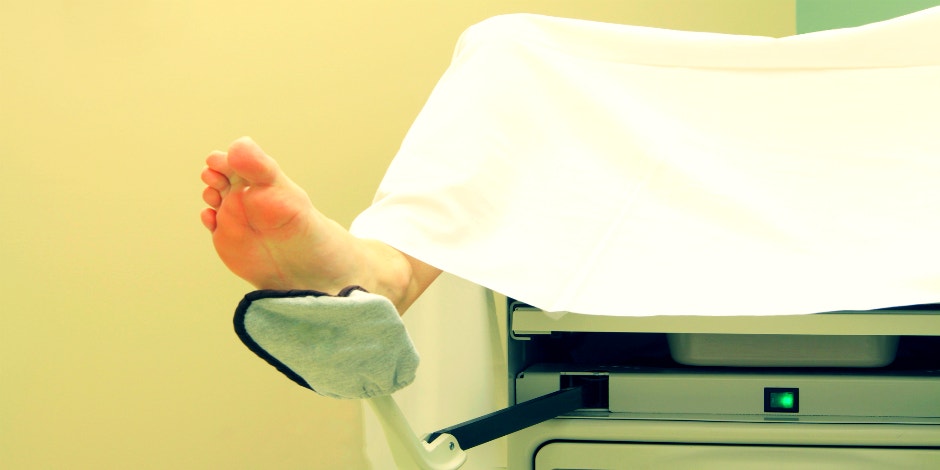Gynos Reveal 10 Things They NEED You To Understand About Your Vagina
Ladies, time to read up on your anatomy.
 istock
istock Being sexually healthy begins with understanding your body, and a lot of us know far too little about what's going on downstairs. Sure, we know where babies come from. We also know how to have sex, and how to give and receive pleasure. Hopefully, that much is true.
But beyond that, there's a whole lot going on inside us that remains a mystery, and gynos everywhere really wish we knew this much about ourselves. There's a whole lot we should know, but gynos share the basics about what wish more women knew about their own body and their vaginas.
This stuff is important, and can make a big difference in how you live your life and know your own body.
1. Your vagina becomes thinner after menopause.
This change can be a cause for pain with intercourse.
"The same effect can occur in women following removal of the ovaries or with use of anti-estrogen medications as part of treating breast cancer. Options to manage this pain can include topical estrogen or topical numbing medicines. More recently, thermal-based treatments of the vaginal epithelium have been tried, although there is no great long-term data on how well these work relative to traditional treatment options," says James L. Whiteside, M.D., an associate professor of OB/GYN at the University of Cincinnati.
2. Your vagina is colonized with "good" and "bad" bacteria.
A "normal" vagina will ordinarily be colonized by more "good" than "bad" bacteria, and this can be estimated by the whether or not the vagina is acidic or basic.
"In a pre-menopausal woman with functioning ovaries, the vagina should be slightly acidic. When the balance of bacteria gets out of whack, odor and discharge can result. This can be treated with an antibiotic, but technically it's not really an infection so much as an imbalance. Remember: the vagina is a self-cleaning oven. Douching can promote the wrong bacteria. Urinary tract infection risk also appears to relate to the kind of bacteria colonized in the vagina," says Dr. Whiteside.
3. Your vagina can fall out.
CampusRiot
It is true the vagina can lose support over time and even manage to fall outside of the hymen (a condition known as pelvic organ prolapse).
"Many women have some lost vaginal support as a result of childbirth and age. There is no need to treat asymptomatic vaginal prolapse. If symptoms do arise (e.g., bulge symptoms, new onset defecatory problems), there are both conservative and surgical treatments," says Dr. Whiteside.
4. Your vagina and your vulva are NOT the same thing.
"The vagina is the fibromuscular tube that extends from the hymen to the cervix. The vulva is encompasses all the parts outside of the hymen to include the labia, clitoris, etc.," says Dr. Whiteside.
5. The G-spot definitely exists.
"The G-spot feels like a walnut and is located just inside of the vagina on the anterior wall. It's there," says Astroglide TTC sexual health advisor, Dr. Draion M. Burch.
6. Your vagina can expand up to 200 percent (!!!!) during sex.
"The vagina has muscular ridges called ruggae inside of it. These ridges expand (just like a penis) during sex up to 200 percent," says Dr. Burch.
7. Your vagina needs exercise.

Popkey
The more you exercise her, the better she works. "Kegels — clenching and releasing — makes your vagina strong," says Dr. Burch.
8. Vaginas come in all shapes and sizes.
All vaginas are NOT made equally. "Some are deep; some are shallow. Even the vulva can be different," says Dr. Burch.
9. You can "train" your vagina to go back to normal after childbirth.

Imgur
If you're worried about things feeling a little loose, there are things you can do to help out, like using Ben-Wa balls.
"These balls are weighted, and you have to use your muscles in your vagina to hold them in. Buy the ones with the string attached to them. This way you can increase resistance by tugging on them," says Dr. Burch.
10. NEVER rush your vagina into having sex after having a baby.
"I give my patients the OK to have sexual intercourse six weeks after delivery. I may ask them to wait longer depending on if their vaginal tears have healed or if they are still having postpartum vaginal discharge. If you have sex before it's time, you may rip your stitches or put yourself at risk of infection. You also should wait for your doctor's permission after a C-section. A C-section is a major surgery; your body needs time to heal from that too," says Dr. Burch.


